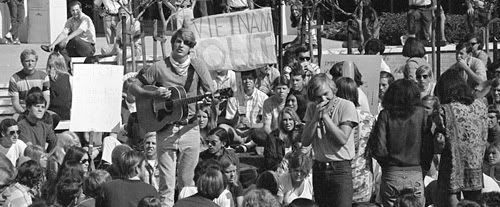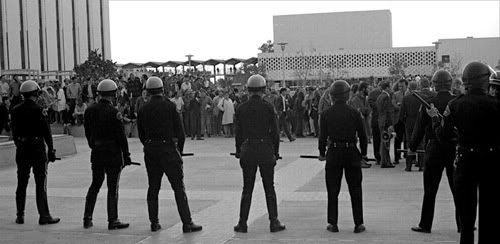Attitudes toward war have changed over the years in Fullerton. During World War I and II, people organized parades honoring returning soldiers. However, during the Vietnam War, people voiced their dissent. Demonstrations at Cal State Fullerton, included “a draft/Vietnam war protest, which brought the police SWAT squad to campus” (Fullerton: A Pictorial History).
A transcript of a 1968 interview for the CSUF Oral History Program includes a fascinating conversation between a college student, and an elderly judge, former Fullerton city attorney Raymond R. Thomson about changing attitudes toward war in Orange County and Fullerton:
Student: In seeing the reactions of the country—Orange County especially—to World War I, World War II, Korea and now Vietnam; when Company ‘L’ left from Santa Ana in World War I there were fanfare parades, the people backed the men and gave them little presents and things. Then in World War II the people seemed to have more of a community spirit with the Guard or with the Army companies that went in. I may be looking at it with more of a subjective attitude because I attend college, where I think reactions in general seem to be different, but now it seems to have changed. Whether the people think the war is right or wrong, the community doesn’t seem to be backing these companies any longer in the way they did. Would you attribute this to size?
Thomson: Well, in World War I and World War II, no one had the slightest doubt or misgiving about the propriety of it there. You are absolutely right, if you were even to intimate or give the slightest clue that you had any second thoughts about it, it would just be unthinkable, because of the complete dedication and fervor in favor of the war. No doubt that it was right against wrong, but now in this Vietnam situation, people are very free to speak their objection. If a young man burned his draft card in World War I or World War II, especially World War I, why he would probably be lynched.
Student: That he would. Do you think that education had affected this, the changes in education, if there had been any?
Thomson: I don’t know, I think maybe we were really absolutely right, in those two instances, fighting the Kaiser who was out to conquer the world, then fighting Hitler, who was out to enslave the world, and had murdered millions of innocent Jews and other groups that he didn’t like. In fighting something like that, there isn’t much room for argument. But way over there (Vietnam) and to send our boys over there to be killed, take sides in a scrap, well, maybe not. You probably have your feelings about it. At least you know how free people are to express their doubts about this particular enterprise.
Student: The youth of the country now seem to be voicing more dissent. In 1930 or 1920, thereabouts, do you think the youth were busier, had more work to do, say, on the farms? Maybe because it was a farming community less leisure time didn’t make dissent that available?
Thomson: That’s probably part of it.
Perhaps the spirit of dissent that characterized the 60s and early 70s dissipated some in the 80s and 90s, but I do not remember there being much dissent regarding the Persian Gulf War or the Iraq War, or the War in Afghanistan, at least not in Fullerton. I remember a few scattered (and sort of small) protests when I attended Cal State Fullerton from 2004-2007.
A Daily Titan article from 2007 describes one such protest: “Nearly two-dozen California State University-Fullerton students marched in protest at the Quad on Thursday while holding anti-war signs and chanting, "We want freedom. We want peace."
However, as was typical of Iraq War protests in Fullerton, “there were Students supporting the war in Iraq assembled on the grass holding signs of their own. "Freedom isn't free," they yelled over the protesting crowd” (Daily Titan, 2007)
I recall a protest in the early 2000s on the corner of Imperial Highway in Brea Blvd where, on one side of the intersection, people held signs that said things like “No Blood for Oil,” and on the other side of the intersection, people waved American flags and held “Support Our Troops” signs.
I suppose the best characterization I can give of current attitudes toward war in Fullerton is...conflicted.


1970 Vietnam War protest at Cal State Fullerton.
